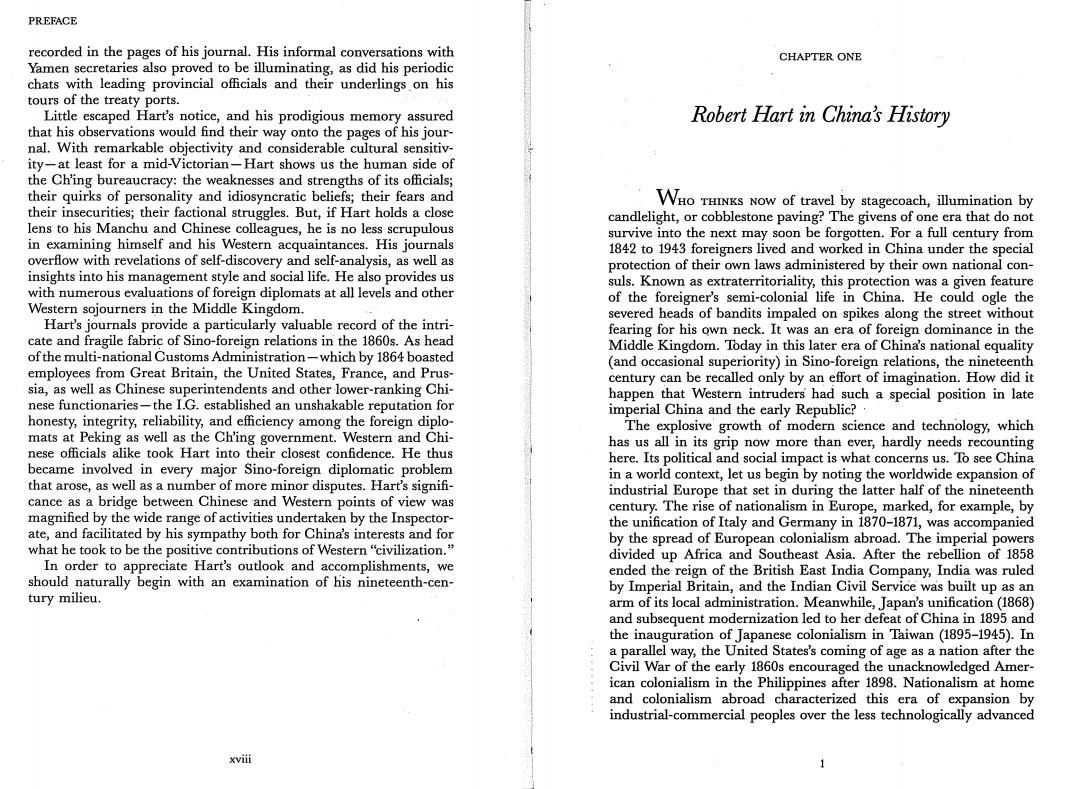正在加载图片...

PREFACE recorded in the pages of his journal.His informal conversations with CHAPTER ONE Yamen secretaries also proved to be illuminating,as did his periodic chats with leading provincial officials and their underlings on his tours of the treaty ports. Little escaped Hart's notice,and his prodigious memory assured Robert Hart in China's History that his observations would find their way onto the pages of his jour- nal.With remarkable objectivity and considerable cultural sensitiv- ity-at least for a mid-Victorian-Hart shows us the human side of the Ch'ing bureaucracy:the weaknesses and strengths of its officials; their quirks of personality and idiosyncratic beliefs;their fears and their insecurities;their factional struggles.But,if Hart holds a close WHo THINKs Now of travel by stagecoach,illumination by candlelight,or cobblestone paving?The givens of one era that do not lens to his Manchu and Chinese colleagues,he is no less scrupulous survive into the next may soon be forgotten.For a full century from in examining himself and his Western acquaintances.His journals 1842 to 1943 foreigners lived and worked in China under the special overflow with revelations of self-discovery and self-analysis,as well as protection of their own laws administered by their own national con- insights into his management style and social life.He also provides us suls.Known as extraterritoriality,this protection was a given feature with numerous evaluations of foreign diplomats at all levels and other of the foreigner's semi-colonial life in China.He could ogle the Western sojourners in the Middle Kingdom. severed heads of bandits impaled on spikes along the street without Hart's journals provide a particularly valuable record of the intri- fearing for his own neck.It was an era of foreign dominance in the cate and fragile fabric of Sino-foreign relations in the 1860s.As head Middle Kingdom.Today in this later era of China's national equality of the multi-national Customs Administration-which by 1864 boasted (and occasional superiority)in Sino-foreign relations,the nineteenth employees from Great Britain,the United States,France,and Prus- century can be recalled only by an effort of imagination.How did it sia,as well as Chinese superintendents and other lower-ranking Chi- happen that Western intruders had such a special position in late nese functionaries-the I.G.established an unshakable reputation for imperial China and the early Republic? honesty,integrity,reliability,and efficiency among the foreign diplo- The explosive growth of modern science and technology,which mats at Peking as well as the Ch'ing government.Western and Chi- has us all in its grip now more than ever,hardly needs recounting nese officials alike took Hart into their closest confidence.He thus here.Its political and social impact is what concerns us.To see China became involved in every major Sino-foreign diplomatic problem in a world context,let us begin by noting the worldwide expansion of that arose,as well as a number of more minor disputes.Hart's signifi- industrial Europe that set in during the latter half of the nineteenth cance as a bridge between Chinese and Western points of view was century.The rise of nationalism in Europe,marked,for example,by magnified by the wide range of activities undertaken by the Inspector- the unification of Italy and Germany in 1870-1871,was accompanied ate,and facilitated by his sympathy both for China's interests and for by the spread of European colonialism abroad.The imperial powers what he took to be the positive contributions of Western"civilization." divided up Africa and Southeast Asia.After the rebellion of 1858 In order to appreciate Hart's outlook and accomplishments,we ended the reign of the British East India Company,India was ruled should naturally begin with an examination of his nineteenth-cen- by Imperial Britain,and the Indian Civil Service was built up as an tury milieu. arm of its local administration.Meanwhile,Japan's unification(1868) and subsequent modernization led to her defeat of China in 1895 and the inauguration of Japanese colonialism in Taiwan (1895-1945).In a parallel way,the United States's coming of age as a nation after the Civil War of the early 1860s encouraged the unacknowledged Amer- ican colonialism in the Philippines after 1898.Nationalism at home and colonialism abroad characterized this era of expansion by industrial-commercial peoples over the less technologically advanced xviⅷ 1